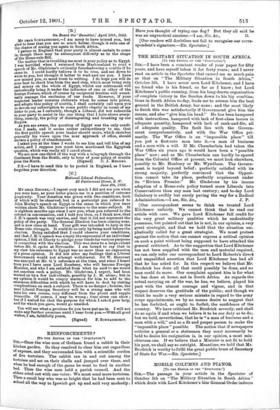THE MILITARY SITUATION IN SOUTH AFRICA.
[To THE EDITOR OP THE "SPECPATOR.1 SIR,—I have been a constant reader of your paper for fifty years, and have myself taken it for forty years ; and I never read an article in the Spectator that caused me so much pain as that on " The Military Situation in South Africa," October 5th. I have never seen Lord Kitchener, and I have no friend who is his friend, so far as I know ; but Lord Kitchener's public running, from his long drawn organisation of complete victory in the Soudan down to his big combina. tions in South Africa to-day, leads me to esteem him the best general in the British Army, bar none ; and the most likely to finish this war satisfactorily if Government give him the means, and also "give him his head." He has been hampered with instructions, hampered with lack of first-class horses in adequate quantity, hampered with lack of rank-and-file, all of adequate quality. The fault lies with the Govern- ment comprehensively, and with the War Office pri- marily. The War Office is an "impossible place" till you put a first-rate man into it,—a man of business and a man with a wilL If Mr. Chamberlain had taken the War Office six years ago it would have been a " possible place" now ; and as Mr. Chamberlain can hardly be spared from the Colonial Office at present, we must look elsewhere, possibly to Mr. Hanbury or Mr. Wyndham. The Govern- ment is torpid beyond belief : perfectly satisfied with its strong majority, perfectly convinced that the Opposi- tion cannot take its place, perfectly acquiescent under its " Riviera Premier." Mr. Gladstone by his insane adoption of a Home-rule policy turned more Liberals into Conservatives than any man last century ; and to-day Lord Salisbury is swiftly but surely paving the way for a Radical
Administration.—I am, Six, &c., J. P.
[Our correspondent seems to think we treated Lord Kitchener unfairly. We cannot think that he read our article with care. We gave Lord Kitchener full credit for the very great military qualities which he undoubtedly possesses, but pointed out that he is not, in our opinion, a very great strategist, and that we hold that the situation em- phatically called for a great strategist. We must protest against the notion that one cannot express a critical opinion on such a point without being supposed to have attacked the general criticised. As to the suggestion that Lord Kitchener has not been supplied with the men and material required, we can only refer our correspondent to Lord Roberts's direct and unqualified assertion that Lord Kitchener has had all that he has asked for. In this respect we believe that Mr. Brodrick has done all that could possibly be done, and no man could do more. Our complaint against him is for what he has done at home, not in South Africa. As regards the actual carrying on of the war, he has, we believe, played his part with the utmost courage and vigour, and in that respect deserves the gratitude of the public ; and though we think he made a very serious mistake in regard to the army corps appointments, we by no means desire to suggest that he has forfeited, or ought to forfeit, the confidence of the country. We have criticised Mr. Brodrick severely, and shall do so again if and when we believe it to be our duty so to do; but we hold, nevertheless, that he is " a man of business and a man with a will," and so a fit and proper person to make the " impossible place " possible. The notion that if newspapers criticise a general or a statesman they must necessarily be held to desire his resignation is, in our opinion, a most mis- chievous one. If we believe that a Minister is not fit to hold his post, we shall say so outright. Meantime, we hold that Mr. Brodrick is worthy to fulfil the great public trust of Secretary of State for War.—En. Spectator.]














































 Previous page
Previous page